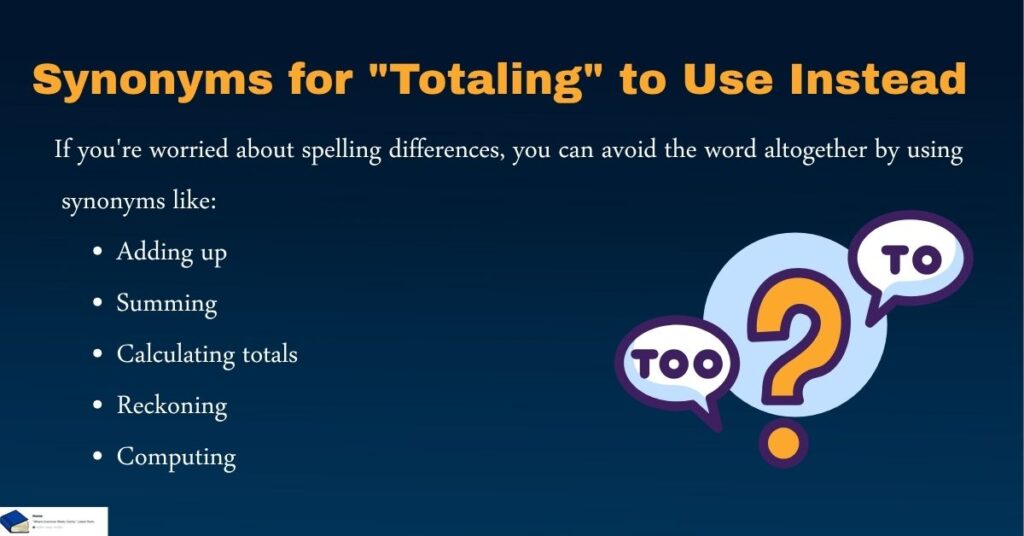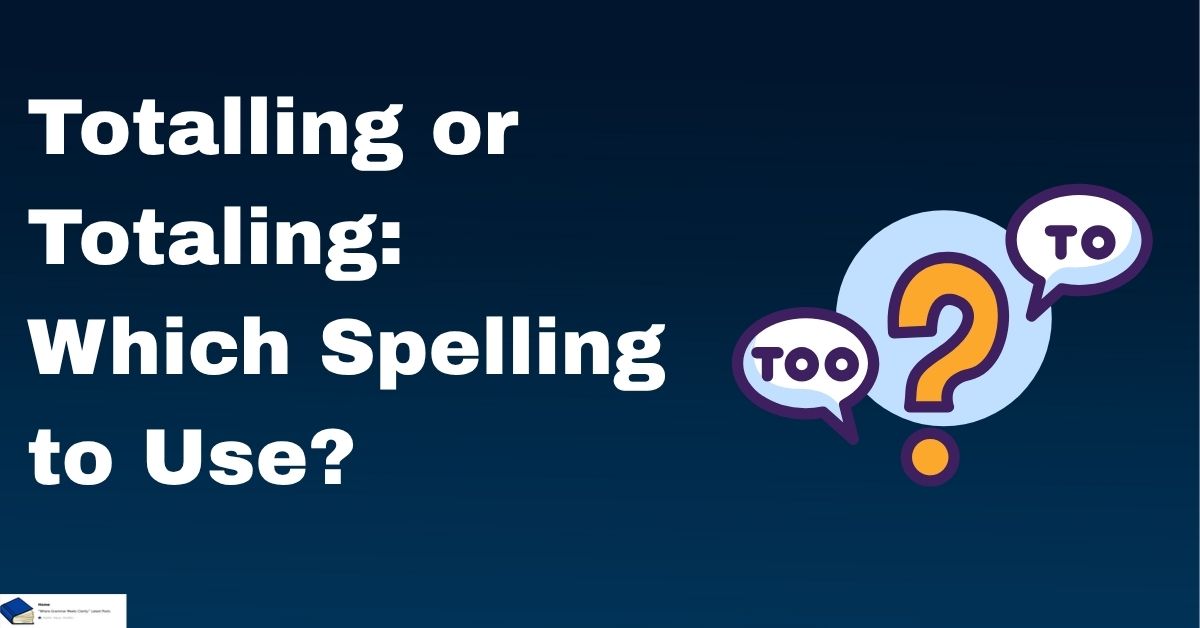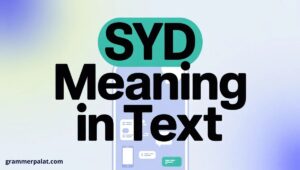If you’ve ever paused mid-sentence wondering whether to write “totalling” or “totaling,” you’re not alone. This small spelling variation often trips up native and non-native English speakers alike. So, which is right totalling or totaling? Well, the answer depends on where you are and who you’re writing for.
Let’s break down the difference between totalling and totaling, explore the rules behind their spelling, and help you choose the correct version for your writing context.
Totalling or Totaling – A Quick Answer
The short answer? Both are correct, but they follow different regional standards:
- “Totaling” is the preferred spelling in American English.
- “Totalling” is the standard in British English.
So when it comes to the question “Which is correct: totaling or totalling?” the real answer lies in your audience and location.
Understanding the Verb “To Total”
Before diving into spellings, let’s take a quick look at the verb “to total.”
As a verb, “total” means:
- To add up or calculate the sum of numbers.
- To destroy completely (especially with cars, e.g., “He totaled his car in the accident”).
Here are a few examples in sentences:
- Ava is totaling all the sales from last week.
- Tom totalled his old sedan after hitting the guardrail.
The different spellings appear when we conjugate the verb into its present participle (“totaling” or “totalling”) or past tense (“totaled” or “totalled”).
The Root of the Confusion: British vs American Spelling
The English language, while shared across many countries, has plenty of regional spelling preferences. The totaling vs totalling debate is one of them.
Let’s break this down:
| Spelling | Region | Examples |
|---|---|---|
| Totaling | American English | “I’m totaling the expenses now.” |
| Totalling | British English | “She’s totalling the numbers.” |
🔍 This is a classic case of spelling variation between British and American English.
Just like:
- Color (US) vs Colour (UK)
- Organize (US) vs Organise (UK)
- Traveling (US) vs Travelling (UK)
The same rule applies to totalling spelling in UK vs US.
Why Does This Happen?
Let’s get into some quick grammar.
English has a rule when turning a verb into its -ing or -ed form:
If a word ends in a vowel + consonant, and the stress is on the final syllable, double the consonant.
But if the final syllable is not stressed, Americans often don’t double the consonant, while British English usually does.
Here’s a breakdown:
| Verb | UK Present Participle | US Present Participle |
|---|---|---|
| Travel | Travelling | Traveling |
| Cancel | Cancelling | Canceling |
| Total | Totalling | Totaling |
This is called the double L spelling rule. So if you’ve ever wondered how to spell totaling correctly, just remember:
🇺🇸 One “L” in the U.S., 🇬🇧 Two “L’s” in the UK.
Examples of Totaling in a Sentence
Let’s look at a few sentence examples to show how this plays out.
American English:
- “I’m totaling the grocery bill now.”
- “The accident totaled her car beyond repair.”
- “We’re totaling up the survey results.”
British English:
- “She was totalling the costs late into the evening.”
- “That crash totally totalled his van.”
- “We’re totalling the feedback before presenting it.”
These examples also highlight how “total” functions as both a verb and noun an important point when choosing the correct form.
Common Mistake
If you’re writing for an international audience or working in a corporate setting, using inconsistent spelling can look sloppy.
For instance, writing:
“I’m totaling the figures and preparing a report totalling the results.”
That creates confusion. The solution? Stick to one spelling system:
- Use totaling and totaled if writing in American English.
- Use totalling and totalled for British or Australian English.
Consistency is key in formal writing, academic papers, emails, and business documents.
Writing for International Audiences
Here’s the challenge: What if your readers are from all over the world?
Let’s say Nina, a content writer in Canada, writes blog articles for clients in both the UK and US. What should she do?
Here are some tips:
- Ask your client or check their style guide (many companies follow either Oxford or Merriam-Webster spelling).
- If you’re unsure, default to American English as it’s more widely used in global business.
- Use a grammar tool like Grammarly or ProWritingAid that allows you to set your preferred English variant.
Writing for international readers? Then this is the time to be intentional about whether you use totalling or totaling.
Synonyms for “Totaling” to Use Instead

For example:
- Instead of: I’m totaling the invoices.
- Try: I’m adding up the invoices.
Problem solved and it keeps your writing neutral and globally readable.
“Total” as Noun, Verb, and Adjective
Let’s not forget total is a versatile word. It can function in multiple parts of speech, which can further confuse its spelling.
✔ Noun:
- “The total of your bill is $53.”
- “What’s the total number of students?”
✔ Verb:
- “I’m totaling the hours.”
- “She totalled the damage costs.”
✔ Adjective:
- “That was a total disaster.”
- “He’s a total stranger to me.”
Understanding this helps avoid mixing up meanings and spellings in longer writing tasks.
Tips to Avoid Spelling Confusion in English
Spelling in English can be frustrating. Here’s how you can avoid mistakes:
Use These Quick Fixes:
- Set your document language to American or British English.
- Run your work through a spellchecker with region settings.
- Stick to one English variety per document.
- Learn common British vs American spelling pairs.
- Bookmark resources like:
Especially when you’re writing emails, resumes, or academic work, this matters a lot.
Totaled or Totalled?
| Form | American Spelling | British Spelling |
|---|---|---|
| Base Verb | Total | Total |
| Past Tense | Totaled | Totalled |
| Present Participle | Totaling | Totalling |
This handy table helps if you’re unsure which form to use depending on your region.
FAQs
How do you spell totaling in UK English?
It’s spelled “totalling” with two L’s.
Is “totaling” a correct spelling?
Yes, in American English, that’s the correct form.
Which is correct: totaling or totalling?
Both are correct, depending on whether you follow US or UK English.
Is “totalling spelling” a mistake?
Nope! That phrase is often searched when people want to confirm the British spelling.
Real-Life Example: A Tale of Two Reports
Let’s say Daniel, based in London, is preparing a finance report for a client in New York.
In his draft, he writes:
“The accountant is currently totalling all revenue from Q3.”
But the client replies:
“Can you please check spelling? Should be totaling.”
Both are technically correct, but in this case, Daniel needs to adapt his spelling to the client’s regional standard.
Conclusion
The totalling or totaling question isn’t about grammar errors it’s about regional preference and context. What matters most is being consistent and clear for your audience.
So next time you sit down to add up numbers, just ask yourself:
- Am I writing for a US audience? ➡️ Go with totaling
- Am I writing for a UK or Commonwealth audience? ➡️ Use totalling
- Writing for a global audience? ➡️ Consider using a synonym or picking one standard and sticking with it.
When it comes to English, little choices like these can make a big impact on clarity and professionalism.









